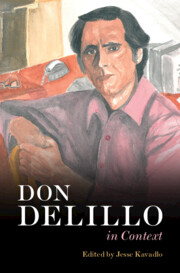Book contents
- Don DeLillo In Context
- Don DeLillo In Context
- Copyright page
- Contents
- Contributors
- Acknowledgments
- Abbreviations
- Introduction: Context, Content, Conflict
- Part I Places
- Part II History and Politics
- Part III Media and Pop Culture
- Part IV Literary Contexts
- Chapter 16 Intertextuality
- Chapter 17 Genre and Genre Theory
- Chapter 18 Modernism and Postmodernism
- Chapter 19 Postmodernism and Literary Criticism
- Part V Material Contexts
- Part VI Social and Cultural Constructions
- Part VII Writing and Writers
- Further Reading
- Index
- References
Chapter 16 - Intertextuality
“An Attempt to Find Pattern and Motive”: Text, Context, Intertext
from Part IV - Literary Contexts
Published online by Cambridge University Press: 19 May 2022
- Don DeLillo In Context
- Don DeLillo In Context
- Copyright page
- Contents
- Contributors
- Acknowledgments
- Abbreviations
- Introduction: Context, Content, Conflict
- Part I Places
- Part II History and Politics
- Part III Media and Pop Culture
- Part IV Literary Contexts
- Chapter 16 Intertextuality
- Chapter 17 Genre and Genre Theory
- Chapter 18 Modernism and Postmodernism
- Chapter 19 Postmodernism and Literary Criticism
- Part V Material Contexts
- Part VI Social and Cultural Constructions
- Part VII Writing and Writers
- Further Reading
- Index
- References
Summary
Julia Kristeva, who coined the term “intertextuality,” argues that because “any text is the absorption and transformation of another … poetic language is read as at least double.” DeLillo’s entire oeuvre is a lesson in dialogue, as his novels talk to each other, replaying critical themes and motifs; they converse with the culture. While the forms of his novels have spanned a panoply of genres, they focus on similar themes: fear of death, the dangers of consumerism and mass media, the vagaries of language and communication, the attraction of transcendence and the salvation of the ordinary, the tensions between the individual and the crowd, terrorists and artists, words and images, mind and body. A catalogue so extensive requires a conversation with philosophy, science, technology, religion, art, politics, literature, historiography, film, music, and finance, to name a few subjects. The noisy cacophony of intertextuality is both unsettling and productive, offering a permeability in the text that invites readers to participate in the creation of meaning and reminds us that history is constructed and ripe for reconsideration.
- Type
- Chapter
- Information
- Don DeLillo In Context , pp. 155 - 164Publisher: Cambridge University PressPrint publication year: 2022



